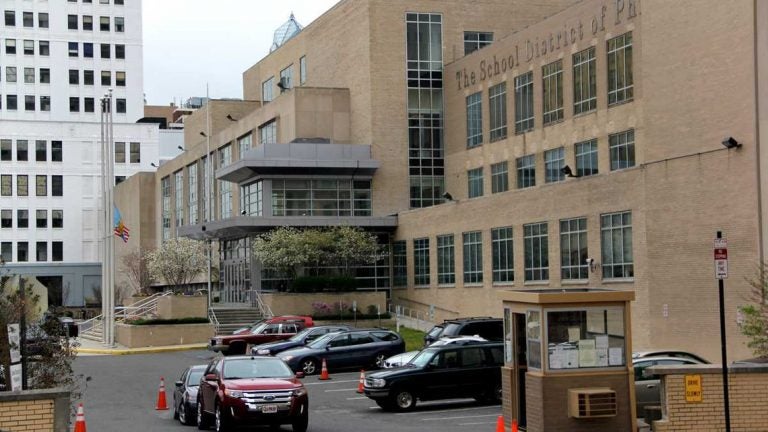The pension loophole: How charters can exploit Pa.’s ‘bizarre’ payment structure

(Emma Lee / WHYY)
Charter schools that participate in the state’s teacher pension system are supposed to make quarterly contributions to the Pennsylvania Public School Employees’ Retirement System.
Typically they do — on time and in full.
But in Philadelphia, seemingly every quarter, a handful of charters come up short or fail to make required payments altogether. What happens afterward is an example of the disjointed relationship among the state, its traditional school districts, and its charter schools — a relationship that has come under increasing scrutiny.
“It’s a very odd system,” said Uri Monson, the School District of Philadelphia’s chief financial officer. “Essentially you have what should be a direct transaction between the charter school — which owes the money — and the state, through PSERS, which is supposed to collect the money.
“This bizarre system puts us in the middle of a transaction we have nothing to do with, and forces us to ultimately sort of become the collection agency for the state.”
How that ‘bizarre’ system works
When a charter fails to make a pension payment, the state covers the shortfall. That part is prescribed by law. The state, of course, does not want to be on the hook for pension payments a charter school was supposed to make.
Problem is, the state can’t go directly to the charter school and ask for a reimbursement because in Pennsylvania money does not typically flow from the state to its charter schools. Rather, in Pennsylvania, the state pays its traditional school districts, which in turn pay the charter schools.
Because of that hitch, the state has to dock the district whatever amount the charter school failed to pay. The district then withholds that same amount of money from the charter.
“It’s not our transaction, yet we get put in the middle and end up looking like the bad guy,” said Monson.
The most prominent recent example of this happened at Delaware Valley Charter High School. The district is withholding $820,000 from the long-troubled charter, according to the Philadelphia Inquirer. Roughly a quarter of the money owed — about $216,000 — stems from delinquent PSERS payments.
The Inquirer reported that teachers from DelVal contacted Monson, saying that the district’s withholding hurts them — they aren’t getting paychecks — even though they aren’t the ones at fault. Monson explained the issues to them, but did not change his stance.
Delaware Valley, said Monson, is the only currently operating charter that has consistently failed to meet its pension obligations. But it’s far from the only charter in Philadelphia to miss a payment.
In June, eight charter schools failed to pay all or some of their pension obligations, and the district had to withhold roughly $728,000. Last June, the missing payments of 13 delinquent charters totaled about $729,000. In the past year, the district’s monthly withholdings have climbed as high as $1.4 million, according to Monson.
In many of those cases, Monson said, the missed payments are small — some less than $5,000 — and stem from honest miscalculations by the schools of what they owe. In other cases, schools miss their payments. And in still other cases, he said, schools in financial distress can leverage a missed pension payment as a sort of no-penalty extension.
Because of the path charter money takes in Pennsylvania, it can be up to three months before a missed pension payment by a charter school results in funds actually being withheld.
“Schools that choose to take advantage essentially get a float for a while,” said Monson.
Monson said the last charter to habitually miss its pension payments was Walter D. Palmer Leadership Learning Partners, which closed suddenly at the end of 2014 amid financial troubles. Before shutting its doors, Palmer missed payments to the tune of $600,000, according to district documents at the time. Under the law, the district, not the state, would be on the hook for those funds.
“It can be a fiscal red flag when schools are not able to make their routine, regular payments,” said Monson. “That causes us some concern to look at the overall financial issues.”
Charter law has many critics
The pension payment loophole is simply the latest oddity to arise from Pennsylvania’s much-maligned charter law.
It hasn’t been substantially revised since its passage in 1997, and the law became a flashpoint in Harrisburg during the recent budget negotiations. Despite a strong push by charter advocates to make substantial changes in the law as part of the deal, legislative leaders ultimately put off the issue until a later time.
Proponents stressed that the revisions they championed would increase charter accountability and transparency and review the problematic charter payment system. But opponents, including Philadelphia Schools Superintendent William Hite, argued that as written, the legislation would have limited districts’ ability to control charter growth and manage their quality. He and others have long said that unfettered charter growth produces a crippling financial drain on district schools.
Hite said that he planned to establish a committee of district and charter representatives to look at the entire charter payment system and make recommendations to the state. Lawmakers indicated that they would resume the battle over changes to the charter law in the fall.
WHYY is your source for fact-based, in-depth journalism and information. As a nonprofit organization, we rely on financial support from readers like you. Please give today.




